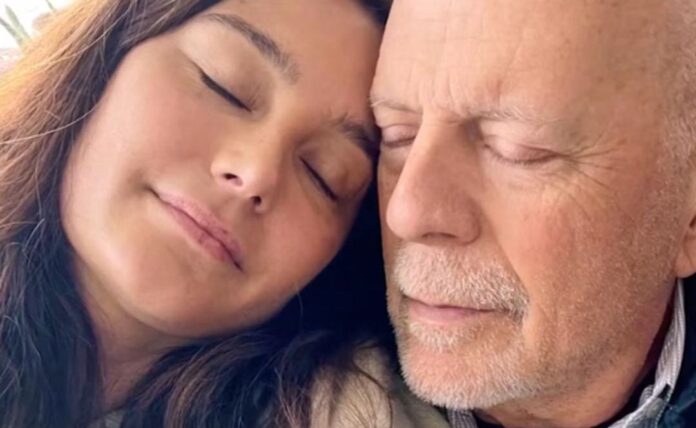After years of private struggle, the Willis–Heming family have made a public and deeply personal decision: Bruce Willis, 70, has moved into a care facility close to his loved ones. In a revealing interview on ABC, Emma Heming Willis, 47, described it as one of the toughest choices they ever faced — but also the choice that aligned most with Bruce’s dignity, their daughters’ wellbeing, and the love that still binds them.
Bruce, who has been battling frontotemporal dementia, is now in a home that offers continuous professional care. Though his speech has gradually faded, Emma emphasized that his physical strength remains. “His mind is failing, but the love is not,” she said. The transition, she added, is not a surrender — it’s about ensuring safety, peace, and the maintenance of what remains of his identity.
A Balance of Care and Continuity
The new facility is not meant to disconnect Bruce from his family; quite the opposite. Emma and the girls — Mabel, 13, and Evelyn, 11 — continue to share moments with him: watching old films, passing bowls of popcorn, sitting together in silence or laughter. These rituals, small as they are, carry the weight of continuity. Emma said, “We wanted him to be surrounded by people who love him. This gives space for joy, rather than fear.”
Even though conversations may no longer carry his voice, the family has adapted. Music, gentle touches, and shared glances now carry their emotions. Emma herself described how letters, songs, and photos have become their language. The human connection, she believes, doesn’t vanish even when words do.
A Decision Born From Love
Moving a loved one into a care facility is rarely easy. For Emma, the decision was agonizing — a crossroads where love, practicality, and the future all collided. She spoke about the internal tug-of-war: wanting to protect Bruce’s independence, but also recognizing that his condition had progressed to the point where he needed care they could no longer fully provide at home.
The overriding motive was always love and respect. In her interview, Emma said she considered how the move would affect their daughters: giving them the chance to be with their father in peace, without the stress of him being alone or endangered at home. She framed it not as giving up, but choosing peace — giving Bruce dignity in his remaining days, and giving their family the ability to make good memories in the time left.
Holding On While Letting Go
Emma admitted this was one of the hardest decisions she’s ever made. But she also said it’s one Bruce might have chosen for himself if he could articulate it now. “It’s not surrender — we’re simply shifting how we show love,” she explained.
Though his voice weakens, the emotional threads that bind them remain. In daily visits and gestures, their devotion still speaks. Some moments are quiet; some are heavy; and some are incongruously joyful. But they are theirs.
Love Beyond Silence
What shines through Emma’s decision is a kind of courageous love — the kind that lets go of pride, puts vulnerability front and center, and trusts that love doesn’t disappear because the mind fades.
Bruce’s new home is described as calm and compassionate — a place built for care, but also for heart. Neighbors and staff talk of gentle routines, familiar faces, and patience. A life once dominated by public roles now finds peace in small rituals: someone holding his hand, someone humming old songs, someone reading his favorite lines aloud.
Emma said the transition isn’t about ending something, but preserving what remains with grace. “We’re still here,” she said. “There’s still joy, laughter, and connection, even when language falters.”
In choosing this path, Emma and their daughters have faced loss head-on — but they also enshrined what matters most: love, dignity, and mutual respect. For them, the future is tender.
They have not given up. They have chosen a different way to stay.


